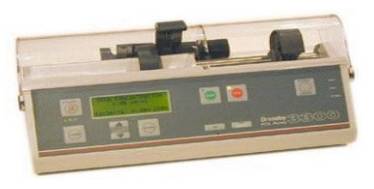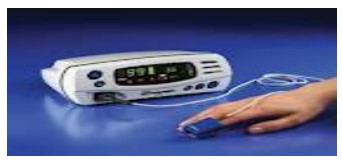Patient Controlled Analgesia (PCA) – A guide for Older Children (8-16yrs)
Please note, this page is printable by selecting the normal print options on your computer.
Q – What is Patient Controlled Analgesia (PCA)?
Patient controlled analgesia (PCA) is a system that allows you to give yourself a safe amount of pain relief medication as and when you need it. It uses a programmed pump (see picture below) containing a syringe of pain relief medicine (usually morphine) which goes into your vein through a thin plastic tube called a cannula.

When you are in pain you can press the button on the handset. When the button is pressed, a safe, preprogrammed dose of morphine is injected? from the syringe into your vein via your cannula (this dose is called a bolus). The nurse will show you how to use the button. Please also ask your nurse if you would like more information about cannulas.
Q- What are the benefits of PCA?
– Research has shown that it is a very safe and effective method of pain relief
– You are in control of your pain relief.
– There is no delay in receiving pain relief.
– There may be fewer side effects such as feeling sick and vomiting
As with all medications, morphine can cause some side effects (listed below). However all of them can be easily managed by giving you a medication to control it or reducing the amount of morphine you receive.
• Feeling sick or being sick
• Breathing may slow down
• Feeling sleepy
• Itchy skin
• Have difficulty going to the toilet
If you experience any of these side effects, feel unwell or ‘not yourself’ in any way, please tell your nurse straight away.
The nurse will regularly assess you for any of these symptoms by asking you questions and monitoring your vital signs such as your breathing and heart rate. You will also be attached to a monitor- that continuously monitors your heart rate and oxygen level. The monitor will sit next to your bed and is attached to you through a lead which is gently secured to your finger (see picture below).

Q. Can I get addicted to the morphine?
Morphine is not addictive when given for pain relief. However, children who are on high doses of morphine for more than a week may find that their bodies become used to its effect. This can be easily managed by gradually reducing the amount of morphine you receive over a few days (this process will only begin when you no longer require morphine as often). This should not delay your discharge from hospital or cause any long term problems (GOSH 2011).
Q. How often can I press the button and can I overdose?
You can press the button as many times as you like. However, the pump has been programmed with a safety feature called the ‘lock out’ period to avoid too much medicine being given.
Q. Does it hurt when I receive the morphine?
Some children say they cannot feel the morphine going into their vein., Some children say that it can feel slightly cold. It shouldn’t hurt, however, if it does please tell your nurse.
Q. Is it possible for the PCA pump settings to be changed by accident?
No, the pump itself is locked with a key to ensure that the settings can only be changed by those who are trained in using the pump.
Q. Can anybody else press the PCA button for me?
No, you are the only person allowed to press the button. You must not allow any hospital staff, friends or relatives to do so. The reason is that if you become sleepy from pressing the button (side
effect of the morphine) you will stop using it and this prevents you having unnecessary extra morphine. If you are having trouble pressing the button, please tell your nurse.
Q. Will the morphine relieve my pain immediately?
No, morphine needs time to get to the spinal cord and brain and it may take 5 minutes or longer for it to work fully. If you know that you are going to be doing something that may cause you some
discomfort such as changing position, getting dressed, it is often advised that you press your handset 5 minutes before doing so.
Q. What if I move my arm or roll onto the PCA tube and squash it?
You can move your arm! If there is an obstruction to the pain relief e.g. you roll onto the tube and squash it, please let the nurses know. The pump may also sound an alarm if there is an obstruction.
Q. What if I am still in pain despite pressing the button?
While you have a PCA, the nurse will regularly ask you how much pain you are in. If your pain is not being managed by the PCA the nurses/doctors may programme the pump to give you a continuous amount of morphine in addition to the boluses. This is called a ‘background infusion’.
Q- Will I receive any other pain relieving medication?
While you have a PCA, you should (if able to) also receive milder pain relieving medications regularly such as paracetamol and ibuprofen. These other medications work on pain in a different way. By giving you a combination of pain relieving medications, you will have the best possible pain relief. For more information on these medications, please ask your nurse/doctor.
Q- How long will I need the PCA?
Your doctors and nurses will be constantly reviewing your pain management. Each child is different and the time you require the PCA will vary. It also depends on why you needed it in the first
place. Usually the PCA is stopped when you are requiring minimal boluses (presses of the button) and your pain can be managed with milder pain relieving medication that can be taken by mouth
such as paracetamol and ibuprofen. On average, most children have the PCA for two to five days.
Q. Will I have pain when the PCA is stopped?
The PCA will not be stopped until any pain that you may still have can be controlled by milder pain relief medicines taken by mouth.
Q. What happens when the PCA is stopped?
Once you come off the PCA, you will continue to be monitored closely for 24 hours after your last dose of morphine as there will still be some morphine in your body. It is also to ensure that your pain can be managed effectively with milder pain relieving medications without the use of the PCA. You will be allowed home once your doctor is happy that you are well enough.
Q- Who/what is the pain control service?
It is a specialist team of nurses and doctors who help the ward nurses and doctors manage your pain. The team gives advice on various methods of pain relief and in particular looks after children on a PCA. The team will visit you at least once a day whilst you are on a PCA. The service is provided Monday – Friday 9am-5pm. After these hours, the on call anaesthetist (a doctor who specialises in pain management and puts people to sleep before an operation) can be called for advice.
We hope this leaflet has given you an understanding of your PCA. If you have any further questions, please speak to your nurse/doctor/play specialist. Remember there is no such question as a silly question!
